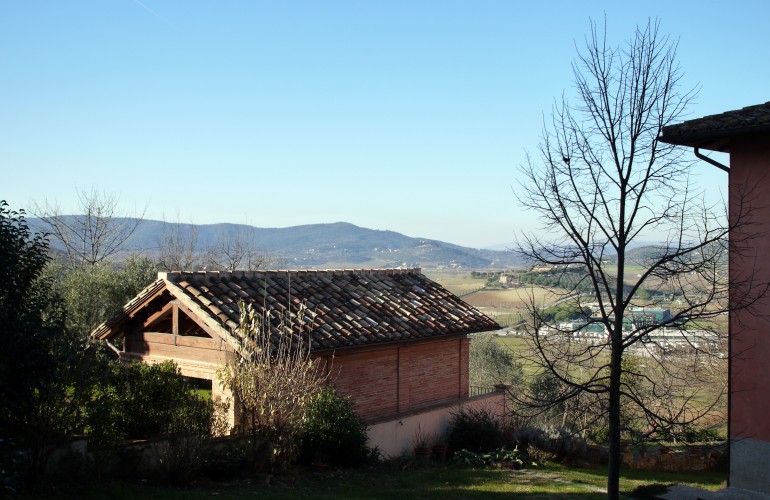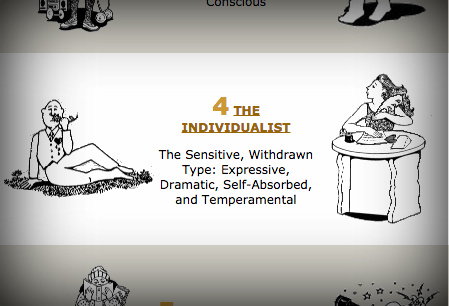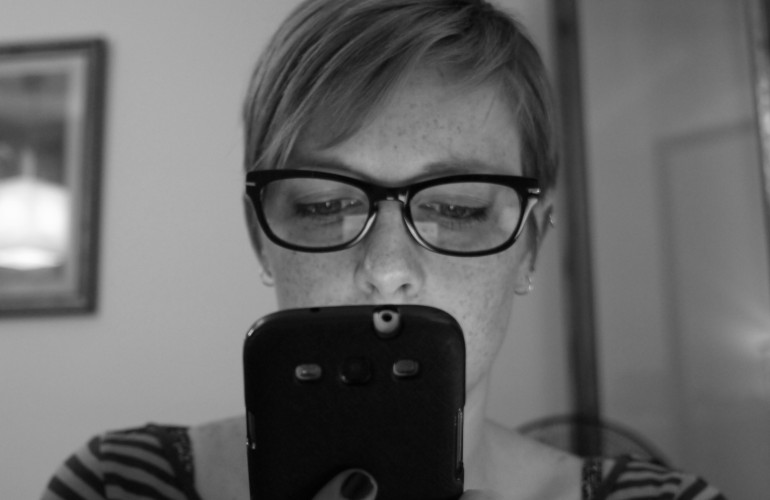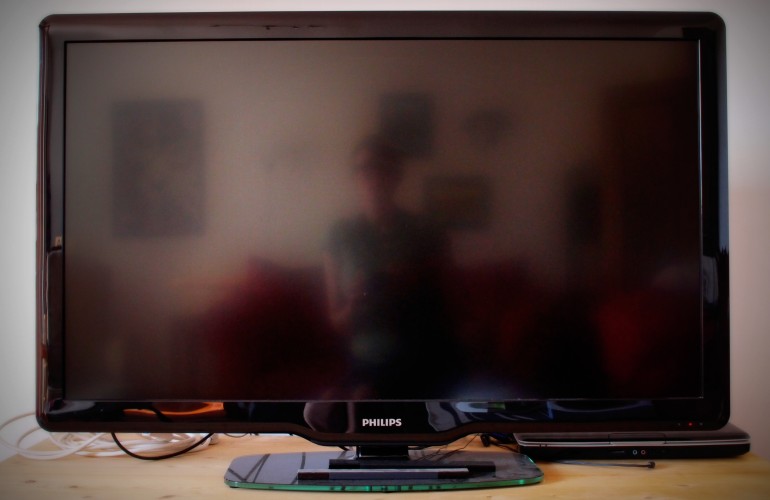Having minored in psychology back in the day, I’m no stranger to the personality test. Every week or so in class, I’d be handed a questionnaire, the answers to which would reveal my Jungian archetype or my Type A/B profile or the likelihood that I would curl up in a ball and cry if ever put in charge of a junior high field trip. (Answer: 1 zillion percent.) I took these questionnaires as seriously as if they were pop quizzes, and I could never get past the feeling that I was unprepared. True, it doesn’t get much more open-book than using your own brain as reference for how you operate. The problem was that I could never confidently circle one choice and move on.
“You know how to put every minute of your time to good purpose: YES or NO?”
Yes. Well, sort of. I suppose it would be accurate to say that I TRY to put every minute of my time to good purpose, but whether I’m actually accomplishing that or not is up for debate. I mean, yesterday evening I spent an hour and a half sneaking around with my roommate pranking the student art exhibit with creations we made out of paper towels and Sharpies, and while fun, it was probably not the best use of an hour and a half. On the other hand, it was a great bonding experience for my roomie and I. On the other other hand, though, we could have bonded over preemptively studying for finals or something. But we made memories! But we also wasted paper towels. Also, come to think of it, we may have inadvertently offended some of our classmates who contributed real art to the exhibit, which wasn’t our intention. If anything, we were trying to make fun of Picasso who is both famous and dead enough to take a little ribbing. Oh crap, now I’m making fun of dead people and putting my soul in jeopardy when I should be finishing up this questionnaire, which clearly shows that I don’t know how to put every minute of my time to good purpose, and oh hell…

“Capillary Attraction” on Quilted Bounty
I probably should have ended up as somebody’s case study.
Recently though, I learned why personality tests have always been such a struggle for me, and in a neat ode to irony, I learned this from a personality test itself. Dan was away on a business trip, and I had about twenty-five too many things to do before I picked up the girls from school… so naturally, I decided to ditch the list and give myself an impromptu crash course in Enneagram theory instead. (See earlier re: knowing how to put every moment of time to good purpose. Boy do I ever.) Have you heard of the Enneagram* before? It had been on my radar for a year or so, but I’d always regarded the topic more or less the way I do the essential oils trend: so preemptively exhausted by the idea that FOMO** doesn’t even put up a fight.
* Pronounced “ANY-a-gram” for those of you whose brains, like mine, begin to melt with anxiety when they can’t figure out how to pronounce a word.
** “Fear Of Missing Out” for those of you whose brains, like mine, huddle up in a dark corner to cry when they can’t figure out an acronym.
I can’t tell you why I suddenly decided that I needed to learn everything about the Enneagram over the course of one too-busy Thursday morning, but I’m glad that I did. And by “glad,” I mean wildly relieved with a side of regret for not having researched this sooner. The longer I read, the clearer it became that despite my psychology textbooks and decades-old journals and lifelong fascination with human nature, I had never seen myself fitting in among the spectrum of personhood. I had spent every minute of my life to date thinking of myself as an anomaly.
That, I learned within two seconds of completing the Enneagram test, is because I’m an Individualist. Seeing myself as fundamentally different from everyone else on earth is a trait that I share with approximately one out of nine people (including, I’m charmed to say, both Kat Von D. and Rumi). Uncertainty about our identities is a hallmark of our personality type, as is withdrawal into the solitary mazes of our emotions. I might be a weird and complicated human being, but anomaly I most certainly am not.
Don’t worry; I’m not about to put you through a crash course in the Enneagram system (though if you’re interested, I’ll link to some resources at the end), nor am I going to expound much further on what my personality type entails. To be honest, I cringe at the thought of anyone reading up on my type as it so exactly describes me and is so unflinchingly thorough. That’s the difference that this personality test made for me above all the others though: It showed me a complete portrait of myself, good and bad, strengths and weaknesses, advantages and pitfalls, ways that I make the world a better place and ways that I inflict damage on it.
Looking at myself that way—as a multi-dimensional member of a known group instead of as an incomprehensible loner—is good and hard at once. I think that part of me was attached to the idea that I was utterly unique and that my shortcomings could be explained away as idiosyncrasies. If I didn’t understand all of myself, then I didn’t need to face all of myself. Now, it’s as if someone has handed me a close-up picture of my face with blemishes and wrinkles and scars enhanced rather than Photoshopped away, and it doesn’t make for a feel-good viewing experience.
That said, the wild relief I mentioned earlier flows deeper than discomfort. Being known as myself by myself is a gift to my thirties, the self-discovery I never quite attained during the years traditionally earmarked for it. I’m seeing clearly at last how all my mannerisms trace paths back to the same emotional switchboard, how I make sense even when I don’t. I’ve become an observer of my own overthinking ways instead of their victim. I have the perspective now to strategize my own growth instead of floundering in despair. And what’s more, so very much more, I’m not alone. I’ve got Johnny Depp and Frida Kahlo and Tchaikovsky in this Type 4 camp with me after all.
I’m reminded of the scene in “The Matrix Reloaded” (bear with me here) in which the Oracle tells Neo that he’s already made a choice; now he just needs to understand why he made it. I didn’t get that line at the time, probably because they’re talking about Neo’s choice to eat a piece of candy, and what is there to figure out? Candy is delicious and should be eaten, the end. Eleven years after watching the film, though, I’m starting to find just how empowering it can be to understand your own motivations. Knowing what makes you tick is a powerful confidence-builder, and being able to offer a sympathetic “Me too!” to yourself when thoughts or feelings overwhelm is one of the most effective self-care techniques I’ve found.
It feels an awful lot like making a friend.
—
What do you think about self-analysis and personality tests? Is there one in particular that’s helped you to make sense of yourself? (If you answer “Which Twilight Character Are You?” I’m going to force you to watch this until your eyeballs bleed.)
Oh, and if you’re interested in learning more about the Enneagram, you can dive into the information online at the Enneagram Institute, read the founders’ Introduction to the Enneagram, check out Richard Rohr’s A Christian Perspective, or take advantage of my friend Leigh’s personal coaching services.


















